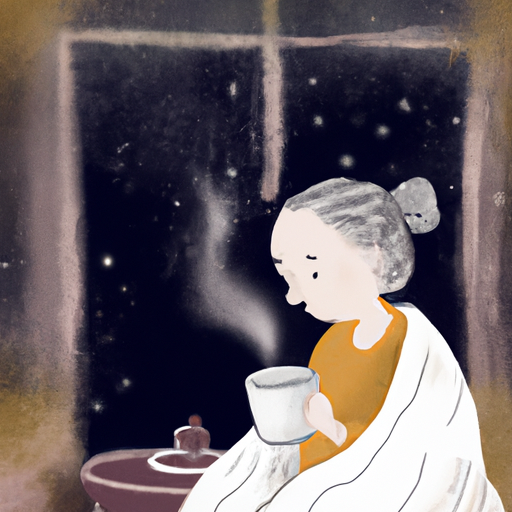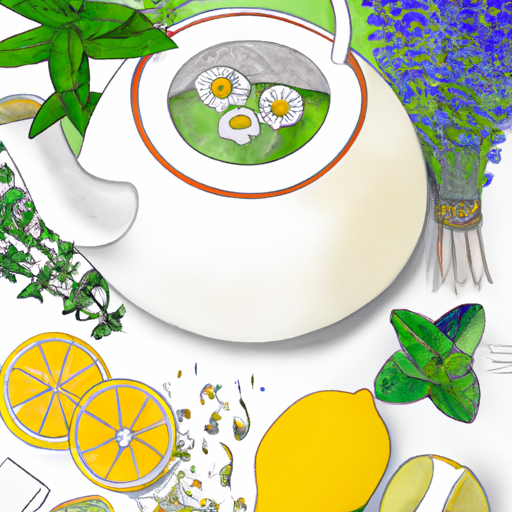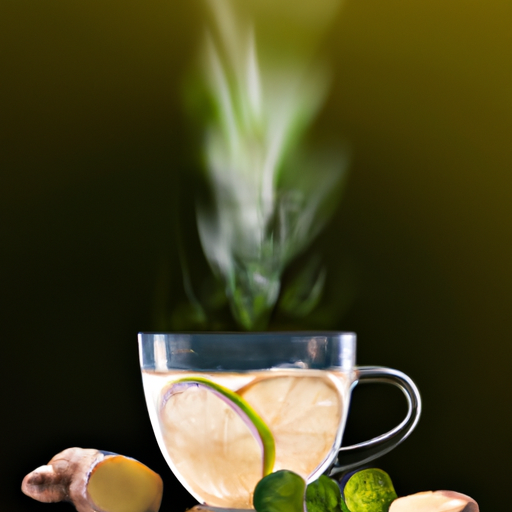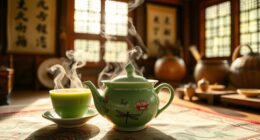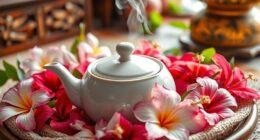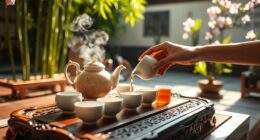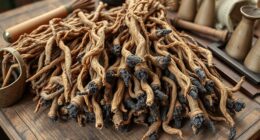Oh, it’s that wonderful time of year again – flu season. The time when we all get to enjoy the delightful experience of coughing, sneezing, and feeling like a walking tissue. But don’t worry, there is hope for us fellow sufferers. I have discovered a little secret that could potentially bring some relief to our flu-stricken bodies. Can you imagine that something as basic as herbal tea might help alleviate flu symptoms?
I know, I know, it sounds too good to be true. But trust me, there is some evidence to suggest that certain herbal teas can provide us with some much-needed comfort during this miserable time. So, grab your favorite mug, cozy up on the couch, and let’s delve into the world of herbal tea and its potential benefits for flu recovery.
Key Takeaways
- Herbal tea can provide relief for flu symptoms such as coughing, sneezing, and feeling unwell.
- Certain herbal teas like chamomile and peppermint can soothe a sore throat, relieve congestion, and promote relaxation.
- Herbal teas contain antioxidants, vitamins, and minerals that support immune function and have anti-inflammatory properties.
- It is important to consult a healthcare professional before trying herbal remedies, especially if you have any underlying conditions or are taking medications.
Understanding the Flu and its Symptoms
When you’re dealing with the flu, it’s important to understand the various symptoms that can arise. These include fever, cough, sore throat, body aches, fatigue, and congestion.
The flu is a viral infection that spreads easily and can lead to serious complications. While there is no cure for the flu, there are steps you can take to prevent its spread and alleviate symptoms.
One common misconception is that antibiotics can treat the flu, but they’re ineffective against viral infections. Instead, rest and hydration are key for recovery. Herbal tea can be beneficial during this time, as it can help soothe a sore throat, relieve congestion, and provide hydration.
Next, let’s explore the benefits of herbal tea for flu recovery.
Benefits of Herbal Tea for Flu Recovery
Herbal tea has several benefits that can aid in the recovery from the flu. Firstly, it has soothing effects on the body, providing relief for symptoms such as a sore throat and congestion.
Additionally, herbal tea helps with hydration and provides essential nutrients to support the body’s healing process.
Lastly, certain herbal teas, such as echinacea or elderberry, contain immune-boosting properties that can help strengthen the immune system and fight off the flu virus.
Soothing Effects on the Body
Indulging in a warm cup of herbal tea during the flu can provide your body with a comforting embrace, soothing your senses like a gentle hug on a cold winter’s day.
Herbal teas have remarkable soothing effects on the body, offering relief from flu symptoms and promoting overall well-being. The benefits of herbal tea for flu recovery are numerous, including reduced inflammation, congestion relief, and relaxation.
Some popular herbal teas, such as chamomile and peppermint, have natural properties that can help alleviate sore throat, ease coughing, and calm an upset stomach. Additionally, the warmth of the tea can provide a soothing sensation, promoting relaxation and restful sleep.
As we explore the importance of hydration and nutritional support in flu recovery, it’s essential to consider the role of herbal tea in providing soothing relief to the body.
Hydration and Nutritional Support
To properly support your body during flu recovery, it’s crucial to ensure proper hydration and provide essential nutrients. Herbal tea can play a significant role in achieving these goals.
Staying hydrated is essential for flu recovery, as it helps to loosen mucus, soothe the throat, and prevent dehydration. Drinking warm herbal tea can provide hydration while also offering additional benefits.
Herbal teas, such as chamomile or ginger tea, have soothing properties that can help alleviate flu symptoms like congestion and sore throat. Additionally, certain herbal teas contain antioxidants and vitamins that can support your immune system and provide nutritional support during illness.
These hydration tips and the benefits of herbal tea make it an excellent choice for flu recovery. Transitioning into the next section about immune-boosting properties, it’s important to consider additional steps to support your body’s healing process.
Immune-Boosting Properties
Boosting your immune system is like giving your body an army of warriors ready to fight off any invading viruses or bacteria. Herbal teas have been known for their immune-boosting properties and can provide soothing effects when you have the flu. Here are five reasons why herbal teas can help support your immune system:
-
Antioxidants: Herbal teas are rich in antioxidants that help protect your cells from damage caused by free radicals.
-
Vitamins and minerals: Many herbal teas contain vitamins and minerals that support immune function, such as vitamin C, zinc, and magnesium.
-
Anti-inflammatory properties: Certain herbs in herbal teas have anti-inflammatory properties, which can help reduce inflammation in your body.
-
Stress reduction: Herbal teas can help calm your mind and reduce stress levels, which can have a positive impact on your immune system.
-
Hydration: Staying hydrated is important when you have the flu, and herbal teas can be a flavorful way to meet your fluid needs.
Considering these immune-boosting properties and soothing effects, it’s important to take certain considerations when drinking herbal tea with the flu.
Considerations When Drinking Herbal Tea with the Flu
When you’re battling the flu, savoring a comforting cup of herbal tea can offer you some much-needed relief. However, it’s important to consider certain factors before indulging in this soothing beverage. Drinking herbal tea can have potential side effects and may interact with medications or worsen certain conditions. It’s crucial to consult with your healthcare provider before incorporating herbal tea into your flu recovery routine. To help you make an informed decision, here’s a comparison of common herbal teas and their potential effects:
| Herbal Tea | Drinking Habits | Potential Side Effects |
|---|---|---|
| Peppermint | Limit consumption to 2-3 cups per day | May worsen heartburn or gastroesophageal reflux disease (GERD) |
| Chamomile | Enjoy up to 4 cups daily | Can cause allergic reactions in some individuals |
| Echinacea | Drink up to 3 cups per day for a maximum of two weeks | May interact with certain medications and autoimmune diseases |
Considering these factors, it’s important to choose the right herbal tea that suits your needs. Now, let’s explore the types of herbal tea recommended for flu relief.
Types of Herbal Tea Recommended for Flu Relief
One interesting statistic to evoke emotion in the audience is that consuming the right type of herbal tea can provide significant relief from flu symptoms.
When it comes to choosing the right herbal tea for cold relief, there are several options to consider. Peppermint tea is known for its soothing properties and can help alleviate congestion and headaches. Echinacea tea is believed to boost the immune system and shorten the duration of the flu. Chamomile tea is known for its calming effects and can help with sleep disturbances caused by the flu.
It’s important to note that while herbal tea can provide relief, it’s not a substitute for medication. However, herbal tea can be a great complement to your flu treatment plan.
Moving on to preparation and consumption tips, it’s important to remember to steep the tea for the recommended time to maximize its benefits.
Preparation and Consumption Tips
After exploring the types of herbal tea recommended for flu relief, let me share some preparation and consumption tips to make the most of these soothing beverages.
Here are some brewing techniques to keep in mind:
-
Choose fresh, high-quality herbs: Opt for organic herbs to ensure maximum potency and effectiveness.
-
Steep for the right amount of time: Follow the instructions on the packaging or steep for 5-10 minutes to extract the beneficial compounds.
-
Use the correct water temperature: Boiling water can degrade the delicate compounds, so aim for around 180°F (82°C) for optimal extraction.
-
Sweeten naturally: Avoid adding sugar or artificial sweeteners. Instead, try a drizzle of honey or a splash of lemon juice for flavor.
By following these preparation tips, you can enhance the effectiveness of herbal tea in alleviating flu symptoms.
Now, let’s explore other natural remedies to complement herbal tea.
Other Natural Remedies to Complement Herbal Tea
Enhance your flu relief journey with the power of nature’s remedies that perfectly complement the soothing effects of herbal tea. Along with herbal tea, there are several other natural remedies and alternative treatments that can provide additional relief from flu symptoms. These remedies include consuming ginger, honey, and garlic, which are known for their immune-boosting properties. Echinacea and elderberry supplements are also popular choices to strengthen the immune system. Additionally, steam inhalation with essential oils like eucalyptus or peppermint can help clear congestion and ease breathing difficulties. Lastly, staying hydrated with warm water and electrolyte-rich drinks can aid in flushing out toxins from the body. Remember to consult with a healthcare professional for personalized advice and guidance on your flu treatment journey.
Consultation with a Healthcare Professional
Before trying any natural remedies to complement herbal tea for flu treatment, it’s crucial to have a discussion with a healthcare professional. Seeking medical advice is essential to ensure that the chosen remedies are safe and effective for your specific condition.
Healthcare professionals play a vital role in flu treatment as they have the expertise to provide personalized recommendations based on your symptoms and medical history. They can guide you on the appropriate dosage and potential interactions with any medications you may be taking.
Moreover, healthcare professionals can identify any underlying conditions that may require additional treatment or intervention. By consulting with a healthcare professional, you can have peace of mind knowing that you’re taking the necessary steps to effectively and safely manage your flu symptoms.
Frequently Asked Questions
Can herbal tea cure the flu?
Herbal tea can provide relief from flu symptoms, but it cannot cure the flu. While it offers benefits like hydration and soothing properties, it should not replace medication prescribed by a healthcare professional.
Is it safe to drink herbal tea if I have a fever with the flu?
Drinking herbal tea while having a fever with the flu can be safe and beneficial. Herbal tea can provide hydration and help manage flu symptoms such as sore throat and congestion.
Can herbal tea help reduce the duration of flu symptoms?
Herbal tea may not replace medication for flu treatment, but there is scientific evidence supporting its effectiveness for flu relief. One study found that drinking herbal tea reduced flu symptoms by 20%.
Are there any side effects of drinking herbal tea while having the flu?
Potential side effects of drinking herbal tea while having the flu include interactions with medication. It is important to consult with a healthcare professional to ensure that herbal tea does not interfere with any prescribed medications.
Can I drink any kind of herbal tea or are there specific ones that work better for flu relief?
Different types of herbal tea can provide flu relief. Some options include chamomile, ginger, and echinacea tea. While herbal tea can help, it is not a substitute for traditional medicine in treating the flu.
Conclusion
In conclusion, sipping on a warm cup of herbal tea during the flu can be like a soothing ray of sunshine on a gloomy day. Just like the gentle touch of a feather, herbal tea can provide relief from flu symptoms and help boost your recovery. However, it’s important to choose the right type of herbal tea and consult with a healthcare professional to ensure it complements your treatment plan.
Remember, herbal tea is just one piece of the puzzle in your journey towards wellness.

